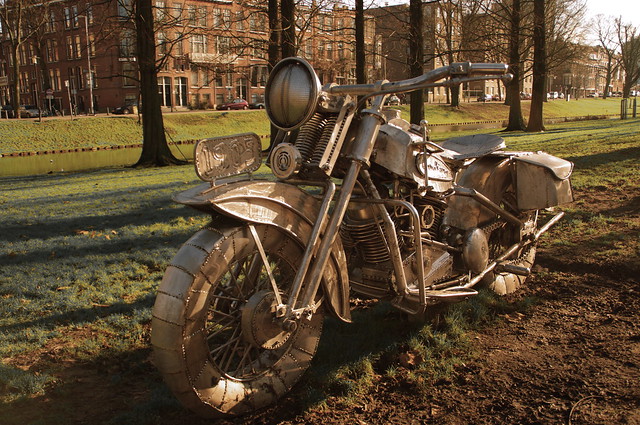Now this is my kind of memorial. Sculptor Maria Rossen designed this monument with the assistance of Arild Veld. It was unveiled at a ceremony on Sept. 24, 2010; the 50th anniversary of the Dutch writer's death. The motorcycle monument is located on Heemraadssingel, across the street from the Rotterdamse Volksuniversiteit, where I am enrolled in a Nederlands (Dutch) language course.
The motorcycle monument, titled: "eenzaam avontuur" (Solitary Adventure) memorializes the post-war writer known to have a passion for motorcycle riding, personal autonomy and authenticity. In the 1940's this gained her attention, but the publishing of her book "Eenzaam Avontuur " (1948) garnered the attention of the Catholic Church's moral monitoring machine. Journalists and members of the book trade, along with the church thrust the book into a February 8, 1949 mock tribunal, "Het Boekentribunaal". They exaggerated the book's flaws and lashed out at its scandalous gay eroticism. Overall, it appeared to be an ugly media situation that got out of hand, bringing her public humiliation. Shortly after this debacle, an unruffled City of Amsterdam judged the book's merit and awarded Blaman the 1949 literature prize. In literary circles, the book has since been regarded as a Dutch classic with Blaman named winner of the 1956 P.C. Hooftprijs (Dutch national prize for literature). Her bibliography credits her with 13 books.
Anna Blaman was the pen name for Johanna Petronella Vrugt. Blaman is short for van Ben Liever Als Man (I'm a better man). Johanna was a teacher from 1926 up to 1934, but chronic poor health reportedly limited her abilities, and in 1935 she resigned her teaching position. Following a brief period of work as an assistant at a gas station and having to deal with a mis-diagnosis of kidney disease, she remained unemployed and focused on writing poetry and fiction. Her real debut was the novel "Romance in Work" (1939). Writing provided her the opportunity to re-enroll at the university and in 1945 she received her degree in French language. This opened many avenues where she spent her summers on the Parisian southcoast immersing herself also in the waters of French existentialism.
In the gaps between Rotterdam, Paris and Amsterdam, where her lesbian lover lived, Johanna forged her identity, but it was her beloved Rotterdam where she returned to live. She was committed to the repair of the war-torn city and her formerly disgraced reputation. Johanna invested in the reconstruction of Rotterdam and in 1952, with W. A. Wagener and A. J. Teychine, she founded the Stakenburg Circle of Authors. She translated for the Rotterdam Theatre, worked as a dramaturge for Rotterdamse Comedie and taught at the Nederlandse Amateur Theatre Union.
In 1955, six months after the publishing of her book, "On Life and Death" Johanna suffered a heart attack. Reportedly her health improved, but she was subsequently forced to live at a moderate pace, and remained in her childhood home, living off the proceeds of her book sales and lectures. In 1960, at the early age of 55, Johanna died from the effects of a cerebral embolism.
Don't waste your time looking for her grave. It was "cleared out in 1990". As you see in this video link below, the museum director places a rose under a tree because Johanna's grave "is no more"; and he goes on to say that "she (her work) must not be forgotten. He offers a commitment to get her books available in the stores again-as noted in this Literary museum video clip. Someone knows the truth about why her grave cannot be found. Perhaps Ram Horna, who organized the 2010 Anna Blaman Year activities can unearth the information related to the mystery and we'll be reading about it over this next year- or at least, that's my hope!
It is brilliant that sculptor Rossen uses this object, a Harley Davidson motorcycle, in memorial to the spirit of Anna Blaman; an object often associated with brazen, independent, men. I can only imagine that when Johanna rode her motorcycle through the war-torn streets of Rotterdam in the late 1940's, she turned many heads. Some journalists and biographers have commented that she lived the lonely, unhappy, yet flamboyant life of a lesbian writer. Whether these descriptions and pieces of information are truth or fiction, this memorial gives Johanna the freedom to ride forever in legend as Anna Blaman- "Ben Liever Als Man".
For specific details and more about the work of this Dutch author, please refer to the newly formed Anna Blaman Society or her current champion, Ram Horna.
*I am grateful for Lilian Dana's language translation and Gabi Helfert's editorial assistance.

No comments:
Post a Comment